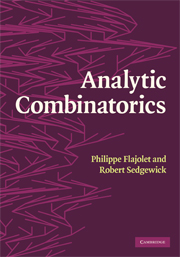Book contents
Appendix C - CONCEPTS OF PROBABILITY THEORY
from Part D - APPENDICES
Published online by Cambridge University Press: 11 April 2011
Summary
This appendix contains entries arranged in logical order regarding the following topics:
Probability spaces and measure; Random variables; Transforms of distributions; Special distributions; Convergence in law.
In this book we start from probability spaces that are finite, since they arise from objects of a fixed size in some combinatorial class (see Chapter III and Appendix A.3: Combinatorial probability, p. 727 for elementary aspects), then need basic properties of continuous distributions in order to discuss asymptotic limit laws. The entries in this appendix are related principally to Chapter IX of Part C (Random Structures). They present a unified framework that encompasses discrete and continuous probability distributions alike. For further study, we recommend the superb classics of Feller [205, 206], given the author's concrete approach, and of Billingsley [68], whose coverage of limit distributions is of great value for analytic combinatorics.
Probability spaces and measure
An axiomatization of probability theory was discovered in the 1930s by Kolmogorov. A measurable space consists of a set Ω, called the set of elementary events or the sample set and a σ-algebra A of subsets of Ω called events (that is, a collection of sets containing ∅ and closed under complement and denumerable unions). A measure space is a measurable space endowed with a measure µ A ↦ ℝ≥0 that is additive over finite or denumerable unions of disjoint sets; in that case, elements of A are called measurable sets.
Information
- Type
- Chapter
- Information
- Analytic Combinatorics , pp. 769 - 778Publisher: Cambridge University PressPrint publication year: 2009
